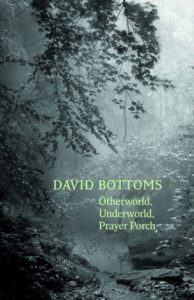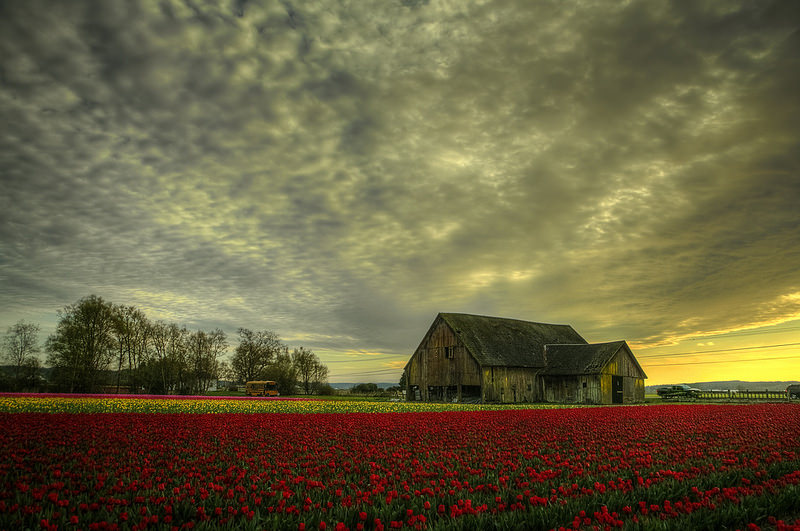To read the 45 poems in the new collection by David Bottoms is to step back into childhood, and then forward again, into caring for a parent in a nursing home. You realize your memories don’t stay in the past but instead come with you, influencing, shaping, and directing. And you often don’t see it except in hindsight.
Otherworld, Underworld, Prayer Porch reminds you of that extended family that exists now only in memory and your submerged DNA. It’s about grandfathers waiting to catch the fox sneaking into the pasture at night, the aunt who made the famous biscuits with no recipe, fishing in the bass boat, and the mother who now sees you as a stranger. And remember the small gator the fisherman caught in 1960?
Bottoms writes about his past and his present. His poems tell stories; how could a poet born in the South not tell stories? And these poems tantalize. You want to know more about the knife your father made and your grandfather says to leave alone. You wondering who hung the bat-box from the gable of the guest bedroom. You ask about the young man classified 1-A in 1968, whether he went to Vietnam or not, but you have to guess the answer. And those songs and hymns and ice cream socials at the Baptist church —they’re here, too, and the names and the dates are somehow less important that the fact that you remember them in the early evening glow.
And don’t forget the church ladies. You couldn’t grow up properly in the South without the church ladies.
Baptist Women

seven major surgeries, two fractured hips,
five ribs, one ankle, assorted broken fingers and toes.
The church ladies who visit
don’t seem to mind. They have their own maladies.
Outside the planet heats up, though it’s not yet summer.
Squirrels thunder all afternoon on the roof.
My mother says something about the voice of God
rumbling in her hearing aid.
She also heard it two weeks ago, a wave in the static
of the emergency room—drip, hum, drip, hum.
A Baptist lady unwraps a casserole.
My mother loves to talk about heart.
The church ladies who visit don’t seem to mind.
They have their own maladies, or relatives have them.
All saints suffer. It’s common knowledge.

David Bottoms
Bottoms has published 10 collections of poetry, two novels, and a collection of essays and interviews. He’s received numerous awards for his work, including the Academy of American Poets Walt Whitman Award, the Levinson Prize, and fellowships from the National Endowment for the Arts and the Guggenheim Foundation. For 12 years, he was poet laureate of Georgia, and he currently teaches at Georgia State University in Atlanta.
The people and the poems of Otherworld, Underworld, Prayer Porch have their analogues in the Midwest, the North, and the West, even while I know them as Southern. The stories of memory and the present are universal. These are the people we loved and who loved us. And we still have them in the poetry of our hearts.
Photo by Andrew E. Larsen, Creative Commons, via Flickr. Post by Glynn Young,author of Poetry at Work and the novels Dancing Priest, A Light Shining, Dancing King, and the newly published Dancing Prophet.
__________________________

“I require all our incoming poetry students—in the MFA I direct—to buy and read this book.”
—Jeanetta Calhoun Mish
- Poets and Poems: Christine Rhein and “Wild Flight” - October 16, 2025
- Poets and Poems: Peter Murphy and “You Too Were Once on Fire” - October 14, 2025
- “Your Accent! You Can’t Be from New Orleans!” - October 9, 2025

Maureen says
Bottoms is such a fine poet. Glad to see his collection reviewed here.
Glynn says
I can’t wait to read his other collections!
Katie says
Glynn,
Thank you for introducing me to David Bottoms.
This made me smile: “And don’t forget the church ladies. You couldn’t grow up properly in the South without the church ladies.”
And from his poem Baptist Women:
“My mother loves to talk about her heart.
The church ladies who visit don’t seem to mind.
They have their own maladies, or relatives have them.
All saints suffer. It’s common knowledge.”
Looking forward to sharing this with my mother who is 93:)
We both grew up in south eastern NC and while she had more of a rural upbringing than I and my siblings, we remember meeting some of those church ladies when our parents took us to homecoming Sunday at her little country church.
Sweet memories.
Gratefully,
Katie
Glynn says
My grandmother was a church lady. Whenever I visited her as a child, she made sure we went to the church ice cream socials on Sunday afternoon. And she brought cake.
Bethany R. says
Thanks for introducing this poet to us, Glynn, I would enjoy reading this collection.
Katie, I’m glad you shared some of your favorite lines here. 🙂
Sandra Fox Murphy says
Oh, this collection amazing! Thanks for highlighting it.